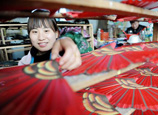
Lu Xiaoming said that companies now realize that to hold onto loyal, existing customers, and to win new ones in a tight market, companies have to "bring luxury back to basics, which means providing a unique experience, backed up by high-end quality and service", he said.
"Luxury brands have to listen to their consumers and understand their needs."
Some luxury brands have already taken action to change their strategy, and get closer to customers.
Louis Vuitton opened its first flagship "Maison" outlet in China on July 21.
Located in Shanghai's Plaza 66, the four-floor store was designed by acclaimed architect Peter Marion.
It is the company's only store offering custom-made shoes and bags in the Chinese mainland.
And to attract local consumers, mahjong and custom-made tea sets are also sold in the store.
Hermes also plans to open its fifth "Maison Hermes" in Shanghai, supplying services including custom-made items.
"We are focused on building long-term relationships with customers, on a more personal and in-depth basis, in order to secure their loyalty," Gucci said in its statement.
The price difference between luxury items sold in the Chinese mainland and overseas is also a hot topic, and many people have now chosen to shop overseas at lower prices.
Import tariffs used to be thought as the main reason for the price difference, but import tariffs are only a scapegoat, some experts say.
The brands themselves insist that logistics costs and other expenses in China mean label prices have to be higher.
Francois Henri Pinault, the chief executive officer of Kering, said the cost of shipping products from Switzerland to China was partly to blame.

















 Photo story: Nostalgia in a small telephone booth
Photo story: Nostalgia in a small telephone booth


![]()
